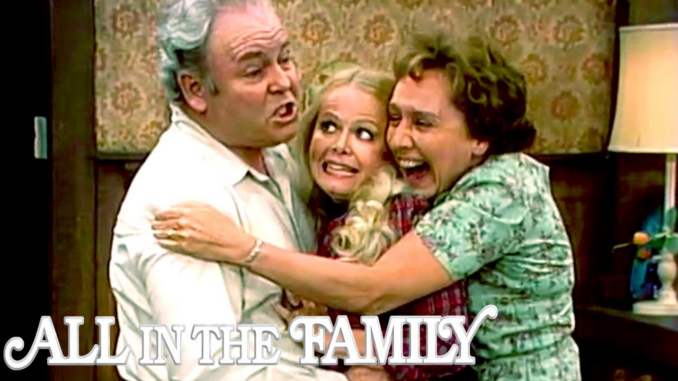
Introduction: There are few TV shows that can claim to have changed the way we think about family, society, and even politics. All in the Family was one of those shows. From its bold, often controversial take on social issues to its unforgettable characters, the show’s legacy endures in pop culture even today. For fans who grew up watching the Bunkers, All in the Family wasn’t just a sitcom—it was a window into the complexities of family life, the clash of ideologies, and the strength of human connection. But it’s also a reminder that we must not forget the importance of understanding and empathy in our everyday lives.
The Comedic Power of All in the Family: The humor in All in the Family was sharp, witty, and often biting. But beneath the jokes and slapstick humor lay the ability to make us think about deeply serious topics. The show’s protagonist, Archie Bunker, was a lovable yet flawed character who represented a significant portion of the American populace—a man with outdated views on race, gender, and politics, yet still deeply human.
Archie’s humor was often based on his ignorance, and viewers couldn’t help but laugh at his absurd attempts to justify his outdated beliefs. But as the show progressed, Archie became more complex. Through his interactions with his wife Edith, daughter Gloria, and son-in-law Mike, audiences witnessed the slow, painful unraveling of his prejudices. Archie’s character became a mirror, forcing viewers to question their own biases, and yet, his comedic appeal never wavered.
The show also excelled in balancing humor with heartfelt moments, often making audiences laugh and cry in equal measure. Episodes like “The Wedding Anniversary” and “The First Day of School” were both hilarious and emotional, showcasing the dynamics of family life in a way that few other sitcoms dared to do.
Unpacking the Drama: Why All in the Family Was More Than Just a Sitcom: While many sitcoms of the time focused solely on humor, All in the Family wasn’t afraid to tackle the real issues of the day. Race, class, gender roles, and political divisions were front and center in the series, offering viewers an honest, unflinching look at the problems plaguing American society.
In episodes like “The Spanish Inquisition,” the show tackled racism head-on. The episode’s plot centers on Archie’s reluctance to accept a Hispanic man as a guest in his home. The humor comes not just from the awkwardness of the situation, but from the way Archie’s beliefs are slowly dismantled throughout the episode. All in the Family used comedy as a tool to break down barriers and confront uncomfortable truths.
Similarly, the show delved into gender roles with a sharp critique. Edith Bunker, a housewife who embodies the traditional role of women, was at the center of many episodes that examined women’s autonomy and strength. The show’s feminist themes were not overtly political, but they still reflected the growing movement for women’s rights during the 1970s.
The Enduring Impact of All in the Family’s Characters: What made All in the Family truly special was its characters. No matter how controversial or outrageous their behavior, they felt real. The Bunkers were a family like any other—flawed, loving, and complex. Archie Bunker may have represented the worst in America’s bigoted past, but the show gave him moments of vulnerability that humanized him. Edith was a sweet, innocent soul who carried the weight of the family’s emotional well-being on her shoulders. Gloria and Mike’s generational conflict provided the perfect backdrop for exploring social issues and debates.
Fans still remember these characters fondly, as they continue to serve as archetypes for the ever-evolving definition of family. The humor may have made us laugh, but it was the heart of the characters that made us care.
Conclusion: A Show That Will Never Be Forgotten: Ultimately, the lasting appeal of All in the Family lies in its combination of sharp comedy, emotional depth, and willingness to tackle tough issues. The show may have premiered over fifty years ago, but its themes of family, love, and the struggle to understand one another are as relevant today as ever. Watching All in the Family today feels like both a history lesson and a timely reminder of the challenges we still face as a society.
In a world where many shows are afraid to tackle hard-hitting topics, All in the Family stands as a testament to the power of television to entertain, educate, and connect people across generations.
